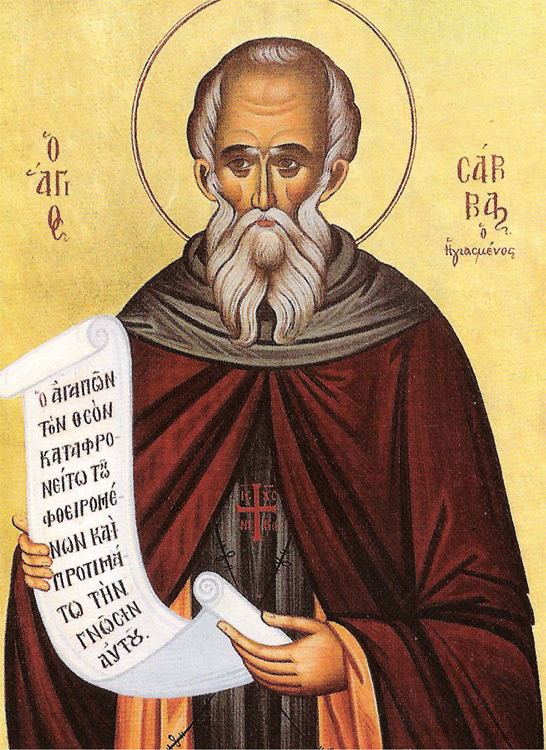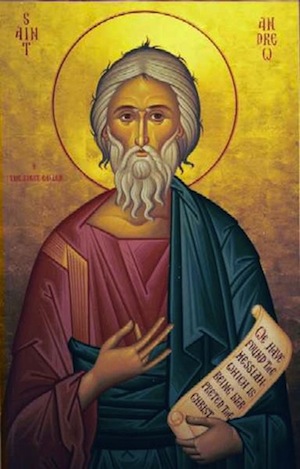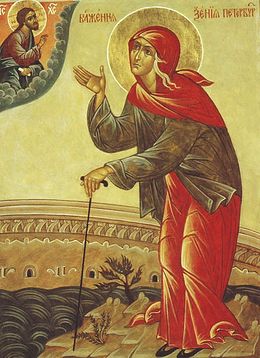Calendar
Saint Sava, First Serbian Archbishop and Enlightener
27. January 2014 - 11:08Rastko Nemanjić the third son of Zupan Stefan Nemanjić and his wife Ana. Rastko was tonsured a monk in 1192 and was given the name of Sava at the monastery of St. Panteleimon on Mount Athos. Soon after he went to the monastery of Vatopedi.
In 1196 Zupan Stefan Nemanja left his kingdom of Raska and became a monk and took the name Simeon where he was tonsured at the monastery of Studenica which he had endowed some years earlier.
Saint Basil the Great, Archbishop of Caesarea
14. January 2014 - 9:55 Basil was born during the reign of Emperor Constantine. While still unbaptized, Basil spent fifteen years in Athens where he studied philosophy, rhetoric, astronomy and all other secular sciences of that time. His colleagues at that time were Gregory the Theologian and Julian, later the apostate emperor. In his mature years he was baptized in the Jordan River along with Ebulios his former teacher. He was Bishop of Caesarea in Cappadocia for almost ten years and completed his earthly life fifty years after his birth.
Basil was born during the reign of Emperor Constantine. While still unbaptized, Basil spent fifteen years in Athens where he studied philosophy, rhetoric, astronomy and all other secular sciences of that time. His colleagues at that time were Gregory the Theologian and Julian, later the apostate emperor. In his mature years he was baptized in the Jordan River along with Ebulios his former teacher. He was Bishop of Caesarea in Cappadocia for almost ten years and completed his earthly life fifty years after his birth.
He was a great defender of Orthodoxy, a great light of moral purity, a religious zealot, a great theological mind, and a great builder and pillar of the Church of God. Basil fully deserved the title "Great." In liturgical services he is referred to as the "bee of the Church of Christ, which brings honey to the faithful and with its stinger pricks the heretics." Numerous works of this Father of the Church are preserved; they include theological, apologetical, ascetical and canonical writings as well as the Holy and Divine Liturgy named after him. This Divine Liturgy is celebrated ten times during the year: on the first of January, his feast day; on the eve of the Nativity of our Lord; on the eve of theTheophany of our Lord; all Sundays of Great Lent, except Palm Sunday; on Great and Holy Thursday and on Great and Holy Saturday. St. Basilreposed peacefully on January 1, 379, and was translated into the Kingdom of Christ.
The Venerable Sava the Sanctified
18. December 2013 - 10:35 The unknown village of Mutalaska, in the province of Cappadocia, became famous through this great luminary of the Orthodox Church. Sava was born there of his parents John and Sophia. At the age of eight, he left the home of his parents and was tonsured a monk in a nearby monastic community called Flavian's. After ten years, he moved to the monasteries of Palestine and remained longest in the Monastery of St. Euthymius the Great (January 20) and Theoctistus. The clairvoyant Euthymius prophesied of Sava that he would become a famous monk and a teacher of monks and that he would establish a lavra greater than all the lavras of that time. After the death of Euthymius, Sava withdrew to the desert, where he lived for five years as a hermit in a cave shown to him by an angel of God. Afterward, when he had been perfected in the monastic life, he began by divine providence to gather around him many who were desirous of the spiritual life. Soon, such a large number gathered that Sava had to build a church and many cells.
The unknown village of Mutalaska, in the province of Cappadocia, became famous through this great luminary of the Orthodox Church. Sava was born there of his parents John and Sophia. At the age of eight, he left the home of his parents and was tonsured a monk in a nearby monastic community called Flavian's. After ten years, he moved to the monasteries of Palestine and remained longest in the Monastery of St. Euthymius the Great (January 20) and Theoctistus. The clairvoyant Euthymius prophesied of Sava that he would become a famous monk and a teacher of monks and that he would establish a lavra greater than all the lavras of that time. After the death of Euthymius, Sava withdrew to the desert, where he lived for five years as a hermit in a cave shown to him by an angel of God. Afterward, when he had been perfected in the monastic life, he began by divine providence to gather around him many who were desirous of the spiritual life. Soon, such a large number gathered that Sava had to build a church and many cells.
Holy Apostle Andrew the First-called
13. December 2013 - 12:28 Andrew, the son of Jonah and brother of Peter, was born in Bethsaida and was a fisherman by trade. At first he was a disciple of St. John the Baptist, but when St. John pointed to the Lord Jesus, saying,Behold the Lamb of God! (John 1:36), Andrew left his first teacher and followed Christ. Then, Andrew brought his brother Peter to the Lord. Following the descent of the Holy Spirit, it fell by lot to the first apostle of Christ, St. Andrew, to preach the Gospel in Byzantium and Thrace, then in the lands along the Danube and in Russia around the Black Sea, and finally in Epirus, Greece and the Peloponnese, where he suffered. In Byzantium, he appointed St. Stachys as its first bishop; in Kiev, he planted a Cross on a high place and prophesied a bright Christian future for the Russian people; throughout Thrace, Epirus, Greece and the Peloponnese, he converted multitudes of people to the Faith and ordained bishops and priests for them. In the city of Patras, he performed many miracles in the name of Christ, and won many over to the Lord. Among the new faithful were the brother and wife of the Proconsul Aegeates. Angered at this, Aegeates subjected St. Andrew to torture and then crucified him. While the apostle of Christ was still alive on the cross, he gave beneficial instructions to the Christians who had gathered around.
Andrew, the son of Jonah and brother of Peter, was born in Bethsaida and was a fisherman by trade. At first he was a disciple of St. John the Baptist, but when St. John pointed to the Lord Jesus, saying,Behold the Lamb of God! (John 1:36), Andrew left his first teacher and followed Christ. Then, Andrew brought his brother Peter to the Lord. Following the descent of the Holy Spirit, it fell by lot to the first apostle of Christ, St. Andrew, to preach the Gospel in Byzantium and Thrace, then in the lands along the Danube and in Russia around the Black Sea, and finally in Epirus, Greece and the Peloponnese, where he suffered. In Byzantium, he appointed St. Stachys as its first bishop; in Kiev, he planted a Cross on a high place and prophesied a bright Christian future for the Russian people; throughout Thrace, Epirus, Greece and the Peloponnese, he converted multitudes of people to the Faith and ordained bishops and priests for them. In the city of Patras, he performed many miracles in the name of Christ, and won many over to the Lord. Among the new faithful were the brother and wife of the Proconsul Aegeates. Angered at this, Aegeates subjected St. Andrew to torture and then crucified him. While the apostle of Christ was still alive on the cross, he gave beneficial instructions to the Christians who had gathered around.
Nativity of our Most Holy Lady Theotokos and Ever Virgin Mary
21. September 2013 - 10:20 The Nativity of Our Most Holy Virgin Mary is celebrated by the Church as a day of universal joy. Within the context of the Old and the New Testaments, the Most Blessed Virgin Mary was born on this radiant day, having been chosen before the ages by Divine Providence to bring about the Mystery of the Incarnation of the Word of God. She is revealed as the Mother of the Savior of the World, Our Lord Jesus Christ.
The Nativity of Our Most Holy Virgin Mary is celebrated by the Church as a day of universal joy. Within the context of the Old and the New Testaments, the Most Blessed Virgin Mary was born on this radiant day, having been chosen before the ages by Divine Providence to bring about the Mystery of the Incarnation of the Word of God. She is revealed as the Mother of the Savior of the World, Our Lord Jesus Christ.
She was born in the city of Galilee, Nazareth. Her parents were Joachim of the tribe of the Prophet-King David, and Anna from the tribe of the First Priest Aaron. The couple was without child, since Anna was barren. Having reached old age, Joachim and Anna had strong faith that everything was possible with God. Joachim and Anna vowed to dedicate the child which the Lord might give them to the service of God in the Temple. Childlessness was considered as a Divine punishment for sin, and Joachim and Anna had to endure abuse from their own countrymen. On one of the feast days at the Temple, the elderly Joachim brought his sacrifice to offer to God, but the High Priest would not accept it, considering him to be unworthy since he was childless.
The Life Of St. Xenia Of Petersburg
11. February 2013 - 14:38 St. Xenia was the wife of Colonel Andrei Feodorovich Petrov, who served as a court chanter. At the age of 26, Xenia was widowed and, appeared to have lost her mind from grief: she distributed her possessions to the poor, dressed herself in the clothes of her reposed husband, and, as if having forgotten her own name, called herself by the name of her reposed husband - Andrei Feodorovich.
St. Xenia was the wife of Colonel Andrei Feodorovich Petrov, who served as a court chanter. At the age of 26, Xenia was widowed and, appeared to have lost her mind from grief: she distributed her possessions to the poor, dressed herself in the clothes of her reposed husband, and, as if having forgotten her own name, called herself by the name of her reposed husband - Andrei Feodorovich.
These eccentricities were not indicative of a loss of reason, however, but signified a complete disdain for earthly goods and human opinion, which places them at the center of existence. Thus, Xenia of Petersburg took upon herself the difficult podvig of foolishness for Christ's sake.
Having come to know the inconstancy of earthly happiness through the death of her beloved husband, Xenia strove toward God with all her heart, and sought protection and comfort only in Him. Earthly, transitory goods ceased to have any value for her. Xenia had a house; but gave it over to an acquaintance under the condition that it be used to shelter paupers. But Xenia herself, not having a refuge, would wander among the paupers of Petersburg. At night she would go out to a field, where she spent the time in ardent prayer.


